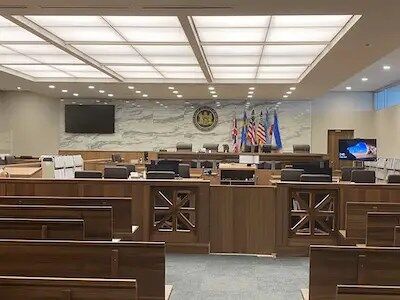(Spotlight Delaware is a community-powered, collaborative, nonprofit newsroom covering the First State. Learn more at spotlightdelaware.org).
Delaware’s unclaimed property system faces renewed scrutiny after a South African alleged the state unlawfully took thousands of shares of Microsoft stock from her retirement account without her knowledge.


Colette Barff, a former employee of the tech giant, filed a lawsuit in October against Delaware, claiming the state took and cashed more than 4,000 of her company shares after deeming her retirement account inactive. State officials then failed to return the shares at their current value of nearly $2 million, according to the lawsuit.
“There is no reason Delaware should take property that belongs to citizens from any other state, let alone any other country,” said Jennifer Borden, Barff’s attorney, in a statement to Spotlight Delaware.
The current legal battle calls into question whether Delaware’s current escheatment laws should handle shares of stock in the same manner that it handles a paycheck or money order, and also whether the state has the right to take property from foreigners.
What is ‘unclaimed property’?
Over the past decade, Delaware’s half-billion-dollar practice of taking unclaimed property has faced repeated legal challenges, with critics calling its seizures of abandoned assets aggressive, particularly when the state takes funds that were paid outside of the state.
More recently, the state had to pay Pennsylvania and 30 other states over $100 million for claiming unused teller checks from MoneyGram, a company that is incorporated in Delaware, but does little business there.
If property – such as checks, gift cards, money orders, abandoned life-insurance plans, bank accounts, or stocks – go untouched for certain periods of time, then they can be turned over to government.
Although this system, legally referred to as “escheatment,” is used in other states, Delaware’s position as the country’s corporate capital for more than two million legal entities and two-thirds of Fortune 500 companies has allowed the state to benefit heavily from the practice.
Delaware law says the state can liquidate seized assets at its discretion and direct the proceeds to the state’s general fund.
In 2024, the state collected more than $550 million in unclaimed property, according to the Delaware Economic and Financial Advisory Council, which accounts for about 7% of Delaware’s budget.
Barff’s lawsuit, which was filed against the state and Delaware’s escheator, Brenda Mayrack, claims that the state had no jurisdiction over her property as a foreign citizen; did not give her adequate notice before deeming her shares abandoned; and failed to correct the error.
Mayrack’s office declined to provide comment for this story.
Did she lose $200K or $2M?
Barff, a longtime citizen of South Africa, worked for Microsoft’s South African entity, a Delaware-incorporated company, for over 20 years.
By 2015, she had acquired 4,326 shares of the company as part of her compensation package, which she planned to use for her retirement.
But when Barff retired in 2022 and attempted to access her Morgan Stanley investment banking account to sell her shares, she learned that the state had taken ownership of her assets.
According to Delaware law, a stock becomes abandoned when the owner has failed to assert dominion or control over, or demand payment, for a period of three years. But Barff argued she had interacted with her fund months before the stocks were declared unclaimed.
In January 2015, Morgan Stanley mailed a first-class letter to her South Africa residence, saying that the company would escheat the shares to Delaware unless there was activity in her account.
But Barff said she never received the mail due to South Africa’s poor postal delivery system, according to court documents.
Just five months prior to the letter, Barff updated her communication preferences on her Morgan Stanley account, which was acknowledged by the company in a response email.
Barff’s lawyers claim that she was exercising dominion over her assets when changing her contact preferences, arguing that the state’s taking of her shares was improper.
Nevertheless, in February 2015, Morgan Stanley forfeited her shares along with nearly $9,000 in dividends she had accumulated from the shares to Delaware.
The state escheator then liquidated the shares four months after taking the assets, which had a liquidation value of $199,577.63 in addition to a credit balance of $8,865.40 and dividends on $1,341.06 for a total of $209,784.09.
Barff did not learn that her assets had been taken until September 2022. After filing a claim with the state, she was reimbursed with the liquidated cash value of the shares.
But in 2024, after Microsoft’s valuation had more than quadrupled in value, her shares were valued at almost $2 million, forcing Barff to lose about $1.8 million.
Barff’s subsequent appeal to the state Tax Appeal Board was denied after it claimed the state gave her all the relief she was entitled to under state law.
‘Reform is definitely needed’
Barff’s attorneys assert that Delaware broke federal law, pointing to prior U.S. Supreme Court rulings that point out that the state cannot take foreign property.
They also claim the state violated the U.S. Foreign Commerce Clause, which says only Congress may regulate commerce with foreign governments.
Borden points out that Delaware’s statute for unclaimed property is in need of serious reform.
“The state should not escheat investments that are intended to be held passively and long-term based on a perceived ‘lack of activity’ after just three years, the same way they escheat, say, a paycheck,” Borden said.
According to court documents, the state claims it acted lawfully under its 2015 statute and was allowed to seize and then sell Barff’s shares after they were reported abandoned.
State officials also say that Barff isn’t entitled to replacement shares since the statute that says owners are entitled to receive the market value of their shares wasn’t added until 2017.
“Even if it applied, she missed the 558-day deadline since notice is deemed 30 days after escheat and she didn’t file until 2022,” court filings stated.
But Barff’s lawyers claim that because she never received the notice, that window is still open.
The state also says pre-2017 state law covered foreign-address property, so it had authority to liquidate the shares.
Escheat stock the same as a paycheck?
Borden asserts that as a result of the matter, Barff now has to settle unexpected tax bills from shares she would not have sold, legal bills, and the loss of her shares.
Barff now seeks the return of her Microsoft shares, reimbursement for the tax bill she paid on a sale she says she wouldn’t have made, and her legal fees.
“This has personally devastated her, as she no longer has sufficient assets to live on her retirement. The stress keeps her up at night,” Borden said.
Charles Elson, founding director of the Weinberg Center for Corporate Governance at the University of Delaware, said he does not believe this case is an example of Delaware’s aggressive practices or overreach, but instead, a question of whether the state or Morgan Stanley was mistaken in not properly notifying the plaintiff.
“It does show that if you’re overseas and have Delaware corporate stock, then there is an issue there, and I guess the question is, ‘Who’s responsible and what is the just way to resolve it?’,” he said.
The state has recently filed a motion to dismiss the case, but it could take weeks for a judge to decide whether they will throw the case away or hear Barff’s argument.












(0) comments
Welcome to the discussion.
Log In
Keep it Clean. Please avoid obscene, vulgar, lewd, racist or sexually-oriented language.
PLEASE TURN OFF YOUR CAPS LOCK.
Don't Threaten. Threats of harming another person will not be tolerated.
Be Truthful. Don't knowingly lie about anyone or anything.
Be Nice. No racism, sexism or any sort of -ism that is degrading to another person.
Be Proactive. Use the 'Report' link on each comment to let us know of abusive posts.
Share with Us. We'd love to hear eyewitness accounts, the history behind an article.